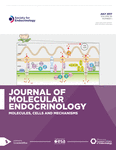- Made available online as an Accepted Preprint 16 September 2009
- Accepted Preprint first posted online on 16 September 2009
Identification of a region in the human IRS2 promoter essential for stress induced transcription depending on SP1, NFI binding and ERK activation in HepG2 cells
- Department of Internal Medicine II, Center for Molecular Medicine Cologne (CMMC), and Cologne Excellence Cluster on Cellular Stress Responses in Aging-Associated Diseases (CECAD), University of Cologne, Kerpener Strasse 62, 50937 Cologne, Germany
- (Correspondence should be addressed to M Schubert; Email: markus.schubert{at}uni-koeln.de)
Abstract
Recent studies have discovered changes in the insulin-/IGF1 signaling affecting glucose metabolism and the molecular pathogenesis of human hepatocellular cancer. Insulin/IGF1 receptor mediates its intracellular effects by recruitment of one out of the four different insulin receptor substrates (IRS). To investigate mechanisms of IRS2 expression, we analyzed transcriptional regulation of IRS2 in human HepG2 cells. We identified a region 688 bp upstream of the translation start codon responsible for ∼90% of basal human IRS2 promoter activity in HepG2 cells, and confirmed binding of specificity protein 1 (also called Sp1 transcription factor, SP1) and nuclear factor 1 (NFI) in this region. Mutation of both SP1 and NFI binding sites or inhibition of extracellular signal regulated kinase (ERK) suppressed IRS2 promoter activity almost completely, revealing a major role of MAP kinases (MAPK) for IRS2 transcription. Activating this cascade with oxidative stress increased IRS2 promoter activity and endogenous IRS2 expression substantially. IRS2 promoter activity rose even more after additional inhibition of p38MAPK indicating an inhibitory effect of p38MAPK on ERK mediated IRS2 transcription. Activation of the MAPK pathway using interleukin 1, beta (IL1B) increased IRS2 promoter activity similar to oxidative stress. In contrast IL1B decreases and inhibition of the MAPK pathway increases IRS1 promoter activity revealing opposed effects of IL1B and ERK on the expression of different IRS proteins. In conclusion we discovered a specific region (−688 to −611 bp) in the IRS2 promoter essential for basal promoter activity and oxidative stress induced transcription depending on ERK activation and SP1 and NFI binding in human hepatocytes.
- Revision received 10 September 2009
- Accepted 14 September 2009
- © 2010 Society for Endocrinology











